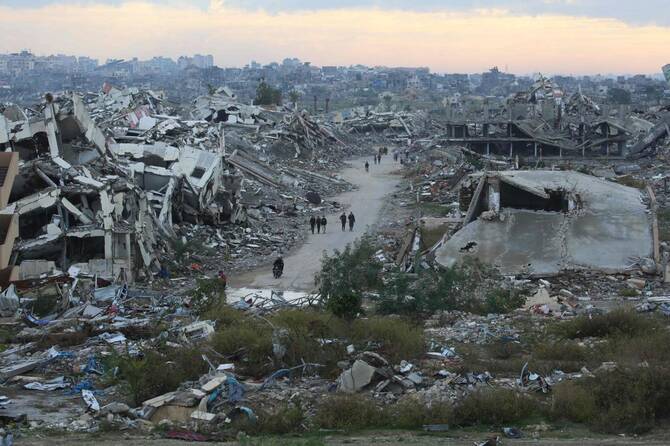DUBAI: The Houthis’ professed attempts to show solidarity with Gaza are not helping but hurting Palestinians in the embattled enclave, Timothy Lenderking, the US special envoy for Yemen, has said.
Since the Israel-Hamas war erupted in October last year, the Iran-backed militia has been launching missiles and drones from Yemen not just at Israel but also at commercial and military vessels in the Red Sea and Gulf of Aden.
The militia says that its actions are an expression of solidarity with Gaza — a claim Lenderking strongly disagrees with, citing the resultant “increasing freight and insurance costs” and higher prices in general.
“It’s just unfortunate that the Houthis have chosen to convey their solidarity with the Palestinians, which many people feel, many Americans feel, many regional countries feel, by attacking regional shipping,” Lenderking said.
“It’s as though I have an issue with my neighbor, and I go and burn down the neighborhood grocery store. It makes no sense.”
He added: “This action by the Houthis is doing nothing to help the Palestinians, nothing to alleviate the suffering of Gazans at all. In fact, on the contrary, it’s complicating the movement of vital supplies into Gaza. So, this is also an adverse effect of what the Houthis are doing. It is simply the wrong reaction.”
Lenderking, a career member of America’s Senior Foreign Service, made the remarks on “Frankly Speaking,” Arab News’ current affairs show. The full interview will be published on Sunday.
The US State Department only recently announced the listing of “Ansarallah, commonly referred to as the Houthis, as a Specially Designated Global Terrorist group.”
Yet, between 2015 and 2022, Houthi missiles repeatedly struck civilian infrastructure and population centers in Saudi Arabia and the UAE, some of which killed civilians.
The State Department had listed the Houthis as a foreign terrorist organization in January 2021 in the last days of former President Donald Trump’s administration but revoked the designation less than one month later when President Joe Biden took office.
Addressing what many view as a double standard on the part of US foreign policy, Lenderking said the recent relisting of the Houthis as a terrorist group was a response to their attacks on civilian and commercial ships “in a reckless, indiscriminate manner,” adding that more than 50 nations have been affected by the latest violence.
“This is becoming a global problem, raising prices, increasing freight costs and insurance costs, not for the wealthy, but for those moving wheat,” Lenderking said.
“This is hurting all sorts of consumers and ordinary people all over the world. And that’s why there’s been such a short, such a sharp reaction and why the reaction is growing against this Houthi behavior.”
Defending the US decision to revoke the Houthis’ terrorist designation in February 2021, Lenderking said that despite some “detestable aspects of (Houthi) ideology” and a litany of documented human rights violations carried out by the group, the US “felt that removing the designation would lessen the stress on humanitarian networks in Yemen,” something that was a priority for the Biden administration.
Though the US has repeatedly affirmed its support for a peaceful, non-military solution to the decade-long Yemeni conflict — backing up its promises with more than $5 billion in humanitarian aid since the start of the conflict — the strikes against the Houthis have cast doubt on Washington’s commitment to peace.
Lenderking said that the Central Command’s retaliatory strikes were limited to military targets only. “The targets that have been selected are all missile sites and storage facilities, UAV (unmanned aerial vehicle) capabilities that are specifically aimed at international shipping,” he said. “They are having significant impact in degrading that capability.”
He underscored the importance of keeping the Houthis focused on the peace process in Yemen as opposed to the war in Gaza.
“I think we all recognize that we are not going to solve any of the problems in the region if we have to keep dealing with these attacks on shipping. So, let the Houthis de-escalate this effort, we de-escalate, and we can move the focus back to helping the Gazans in a genuine and effective way,” he said.
“And also working toward a genuine and durable peace in Yemen.”
The full episode of Frankly Speaking will be released on Sunday.













